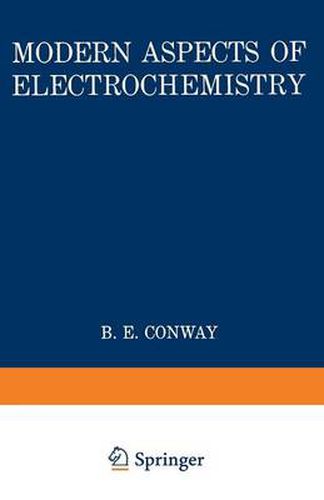Readings Newsletter
Become a Readings Member to make your shopping experience even easier.
Sign in or sign up for free!
You’re not far away from qualifying for FREE standard shipping within Australia
You’ve qualified for FREE standard shipping within Australia
The cart is loading…






This title is printed to order. This book may have been self-published. If so, we cannot guarantee the quality of the content. In the main most books will have gone through the editing process however some may not. We therefore suggest that you be aware of this before ordering this book. If in doubt check either the author or publisher’s details as we are unable to accept any returns unless they are faulty. Please contact us if you have any questions.
The present volume contains five chapters covering areas of contemporary interest in the fields of electrolyte solutions, the state of solvent molecules at electrode surfaces, charged colloid interfaces, surface chemistry of oxide electrodes and electro chemistry, and bioelectrochemistry of charge transfer complexes. The first chapter, by Barthel, Wachter, and Gores, covers the topic of conductance of nonaqueous pro tic and aprotic electro lyte solutions. This field is not only of intrinsic interest in itself, illustrating the important departures of ion-transport behavior in organic solvents from that, more well known, in water, but the information and extensive new data presented in this chapter will be of interest to those working with nonaqueous alkali-metal batteries where the conductivity and ion-association behavior of electrolytes in various solvents other than water is of great importance. The second chapter is devoted to a very fundamental and ubiquitous aspect of electrochemistry of electrodes: the state of solvent molecules, adsorbed and oriented, at their surfaces. The role of solvent adsorption and orientation in double-layer proper ties, it will be recalled, remained poorly understood until the early 1960s. This chapter, by Trasatti, gives a thorough account of the present state of knowledge of solvent orientation at electrode interfaces and of the unsuspected (until recent years) role it plays in properties of the double layer and in determining the potential profile at charged metal surfaces in solution.
$9.00 standard shipping within Australia
FREE standard shipping within Australia for orders over $100.00
Express & International shipping calculated at checkout
This title is printed to order. This book may have been self-published. If so, we cannot guarantee the quality of the content. In the main most books will have gone through the editing process however some may not. We therefore suggest that you be aware of this before ordering this book. If in doubt check either the author or publisher’s details as we are unable to accept any returns unless they are faulty. Please contact us if you have any questions.
The present volume contains five chapters covering areas of contemporary interest in the fields of electrolyte solutions, the state of solvent molecules at electrode surfaces, charged colloid interfaces, surface chemistry of oxide electrodes and electro chemistry, and bioelectrochemistry of charge transfer complexes. The first chapter, by Barthel, Wachter, and Gores, covers the topic of conductance of nonaqueous pro tic and aprotic electro lyte solutions. This field is not only of intrinsic interest in itself, illustrating the important departures of ion-transport behavior in organic solvents from that, more well known, in water, but the information and extensive new data presented in this chapter will be of interest to those working with nonaqueous alkali-metal batteries where the conductivity and ion-association behavior of electrolytes in various solvents other than water is of great importance. The second chapter is devoted to a very fundamental and ubiquitous aspect of electrochemistry of electrodes: the state of solvent molecules, adsorbed and oriented, at their surfaces. The role of solvent adsorption and orientation in double-layer proper ties, it will be recalled, remained poorly understood until the early 1960s. This chapter, by Trasatti, gives a thorough account of the present state of knowledge of solvent orientation at electrode interfaces and of the unsuspected (until recent years) role it plays in properties of the double layer and in determining the potential profile at charged metal surfaces in solution.